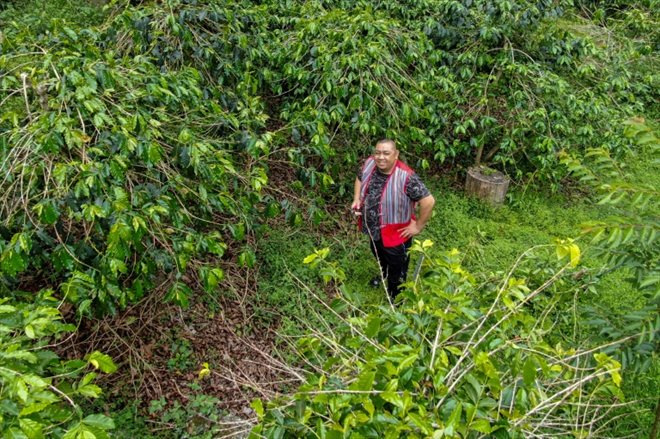The dry bed of Tswengwen Reservoir on May 13, 2023 in southern Taiwan (AFP/Sean Chang)
For several months, the South of Taiwan has been facing a major wave of drought, affecting the bamboo forests of the island and the way of life of the indigenous communities, particularly oriented towards the cultivation of this plant.
The Tsou community has lived off the bamboo forests of Alishan, a region in southern Taiwan, where the first shoots are usually harvested from April and May for generations.
But the “weather has really changed in recent years,” Avayi Vayayana, 62, head of the Tsou community, told AFP. “The rains have been delayed and the growth of bamboo shoots is badly affected.”
Since the end of 2022, no heavy rain has fallen on this part of the island, with dramatic consequences for the local bamboo culture. Which, not coming out of the ground for lack of rain, are becoming increasingly difficult to spot.
“Young shoots won’t sprout if it doesn’t rain,” says Avayi Vayayana. “After a while, they will die like this in the ground.”

Avayi Vayayana, leader of the indigenous Tsou community, harvests bamboo shoots on May 12, 2023 in southern Taiwan (AFP/Sean Chang)
Result? The latest harvest of bamboo shoots from the Tsou community, which has a population of 7,000 across the Alishan region, has dropped drastically this year.
That of Avayi Vayayana, for example, has decreased by two thirds compared to 2022.
In addition to the drought, there are also monkeys who now attack bamboo crops, despite all the efforts of Avayi Vayayana’s family to chase them away.
“As many bamboo forests in the surrounding area are dead, the monkeys go where there are bamboo shoots,” he points out.
– “In the first line” –
Southern Taiwan is suffering the worst drought in decades.

A bamboo forest near the indigenous village of T’fuya in the Alishan region on May 12, 2023 in southern Taiwan (AFP/Sean Chang)
The level of Tsengwen Reservoir, which supplies Taina and Chiayi provinces in southwest Taiwan, has fallen 10 percent this year, the third such drop since 2018.
This reservoir, the largest on the island, supplies water to a colossal foundry, producing the precious Taiwanese semiconductors, but also supplies the rice-growing plains of the region.
A sign that water needs are high, farmers in this part of the island have been offered state subsidies so that they do not plant their crops.
In the Alishan region, located an hour’s drive from the reservoir, only 226.5 millimeters of rain fell from January to April, half as much as the same period last year, according to the Central Meteorological Bureau of Taiwan.
For the Tsou community, whose way of life is closely linked to natural resources, the impact is “total”, estimates Lena Chang, of the NGO Greenpeace in Taiwan.
“They are on the front line in the face of climate change,” she insists.

Aerial view of the indigenous village of T’fuya in the Alishan region on May 12, 2023 in southern Taiwan (AFP/Sean Chang)
In the indigenous village of T’fuya, located in the Alishan region, residents empty their bags of bamboo shoots, then weigh them before sending them to factories to be prepared and canned.
“This year, the rain came too late and many bamboo trees are sick. The harvest is very poor,” said 24-year-old Voyu Baniana.
– Coffee growing as a substitute –
Those who have returned to their village, after leaving for a time to work in town, find it increasingly difficult to live from bamboo cultivation.
Voyo Yulunana, 43, still remembers the long days he spent as a child harvesting sprouts, staples of the local economy.

Voyo Yulunana at his coffee plantation near the indigenous village of T’fuya on May 12, 2023 in southern Taiwan (AFP/Sean Chang)
“To buy a car or build a house, we relied on bamboo,” he says.
After briefly working in the city in the construction industry, Voyo Yulunana found that “the rains never come when they should”.
Luckily, his grandfather converted to coffee growing, which many young Tsou have also turned to over the past ten years.
“Coffee is gradually replacing bamboo shoots as a cash crop” in the region, he observes.
But coffee culture is not immune to changes linked to climate change either. Last year, very erratic weather ravaged the harvest of Voyo Yulunana’s family and their 400 coffee trees.
“Today, I can get by growing just coffee,” he says, adding, however, “who knows what new crops will replace coffee?”
© 2023 AFP
Did you like this article ? Share it with your friends with the buttons below.




